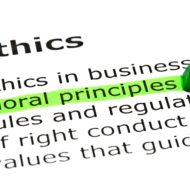Definitions
Article / Produced by TOW Project
The word “ethics” comes from the Greek word ethos, which has two meanings in common Greek usage: habit or custom, and ordinance or law. Usage in the New Testament includes both of these dimensions. For example, in Acts 25:16 it is usually translated “custom” (“it was not the custom of the Romans to hand over anyone”), whereas in 1 Cor. 15:33 it is translated as “morals” or “character” (“Bad company ruins good morals,” NIV).
The two words — ethics and morals — are often used interchangeably. You could say that ethics is the study or science of moral principles that govern or influence our conduct. Dennis Hollinger says ethics is “…the systematic study of standards of right and wrong, justice and injustice, virtue and vice, with a view to applying those standards in the realities of our lives.”[1]
Christian ethical living is concerned with “…ordering our steps in every situation of life according to the fundamental faith commitments we share as Christians.”[2] Or, according to another definition: “Christian ethics is the attempt to provide a framework and method for making decisions, that seeks to honor God as revealed in Scripture, follow the example of Jesus and be responsive to the Spirit, to achieve outcomes that further God’s purposes in the world.”[3]
Dennis P. Hollinger, Choosing the Good: Christian Ethics in a Complex World (Grand Rapids: Baker, 2002) 14.
Stanley J. Grenz, The Moral Quest (London: Apollos, 1997) 19.
Alistair Mackenzie and Wayne Kirkland, Just Decisions (New Zealand: NavPress NZ, 2008).
Popular Content
Popular Content
Table of Contents
Donate
Topics
Copyright
Contributors: Alistair Mackenzie and Wayne Kirkland
Adopted by the Theology of Work Project Board July 29, 2010. Revised Dec. 1, 2010.
Image by
Used under license from Veer
.
Used by permission.
Theology of Work Project Online Materials by Theology of Work Project, Inc. is licensed under a Creative Commons Attribution-NonCommercial 4.0 International License. Based on a work at www.theologyofwork.org
You are free to share (to copy, distribute and transmit the work), and remix (to adapt the work) for non-commercial use only, under the condition that you must attribute the work to the Theology of Work Project, Inc., but not in any way that suggests that it endorses you or your use of the work.
© 2010 by the Theology of Work Project, Inc.
Unless otherwise noted, the Scripture quotations contained herein are from the New Revised Standard Version Bible, Copyright © 1989, Division of Christian Education of the National Council of the Churches of Christ in the U.S.A., and are used by permission. All rights reserved.





